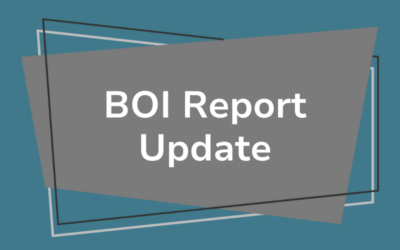There’s a lot of misinformation out there about keeping business and personal finances separate. Truthfully, most entrepreneurs tap into their personal savings to start their businesses, so opening separate bank accounts isn’t their top priority when there are so many other things to handle. However, not maintaining independent business and personal bank accounts can cause all sorts of bookkeeping confusion and tax hassles—and who has the time to deal with all that?
So here are some answers to the most frequently asked questions about having separate bank accounts for personal and business use.
What is the difference between a business account and a personal account?
Shopping for a business bank account is more complex than opening a personal bank account but doing your due diligence ahead of time helps make the process smoother. For a business account, you need to ask about different features and services than you would with a personal bank account so make sure you know the type of services you need.
For example, will your business have employees? If so, you’ll want to see how much it costs to run payroll and pay employment taxes. If you’re going to accept credit card payments for your business, you need to know about the bank’s merchant account service fees. Today, most banks have digital banking systems that sync up to your small business accounting platform, so find out which platforms the bank’s system supports. In addition, you need to understand the fees for bill paying, minimum balances required, wire transfer fees, number of locations, and mobile banking capabilities.
It’s wise to start with the bank where you already have a personal account, as they may offer you some free or discounted options if you keep both your business and personal accounts at the same bank. On the other hand, it’s also good to ask other local companies where they bank to explore your options. Be sure to ask about customer service response time. While you probably have not had to interact with bank representatives much for your personal account, you will most likely need questions answered with a business bank account.
Can I use a business account for personal expenses?
It is not a good idea to use your business bank account for personal expenses, not even if you plan to pay the business back. Using business funds for personal reasons raises a red flag to the Internal Revenue Service (IRS) and could land you in hot water (i.e., audits and tax penalties). In addition, business expenses must be directly tied to a business purpose, and you may be asked to provide proof of how you spent the money.
Can I use my personal bank account for my small business?
Again, it is not advisable to use a personal bank account for a small business, mainly because the IRS could see your business as a hobby and not a business formed to make a profit. Business owners can deduct expenses directly related to the business; hobbyists cannot.
If you need to use personal funds for the business, talk to your accountant about the best way to document the transaction. Many business owners deem the money a contribution or equity—and the company does not pay the owner back. It could be considered a loan, which has to be repaid, but again make sure your accountant helps you record the transaction correctly.
Is it legal to transfer money from a business account to a personal account?
Transferring money from a business account to a personal account happens all the time. Still, the transaction should always be recorded in the business’s accounting program, and the reason for the transfer must be clearly documented.
Legitimate reasons include:
- Payroll transfer (owners are employees of a company structured as a C corporation)
- Dividend distribution
- Owner draws (personal money contributed to the company can come back to the contributor as an owner draw.)
- Expense reimbursement (create an expense report and check IRS guidelines on business expenses)
Again, we recommend asking your accountant before initiating a transfer, so you don’t raise any red flags.
Do I need a separate bank account if I am self-employed?
Although it is not illegal to keep business and personal funds in the same bank account, it is not recommended. A sole proprietorship is considered a nonentity, and there is no legal separation between you and the business. That means profits, losses, and liabilities are tied to the owner’s personal assets. However, that makes it even more vital to have separate business and personal bank accounts. If you or your company are audited, the burden of proof is on you to show separate business and personal expenses and income. Having a separate business account makes the process a lot simpler.
Also, to claim business expenses as deductions, sole proprietorships must report income and losses on a Schedule C (Form 1040). Separate business and personal accounts support your declaration that you are running a legitimate business and not just claiming unsubstantiated deductions.
Does an LLC need a business bank account?
The legal structure of your business does come into consideration when deciding to open a business bank account. While a sole proprietorship is not required to have separate bank accounts, it is advised. Likewise, a general partnership is not required to maintain a separate business account. Both structures could use social security numbers to open an account.
On the other hand, if you set up your business as a Limited Liability Company (LLC) or corporation, you must have separate business bank accounts. Plus, you will need to obtain a Federal Tax ID number or EIN before the bank accepts your business. Incorporating creates a separate entity from the owners’ personal assets and therefore requires separate financial records. The business is accountable for its debts and legal obligations. The proper terms that describe the legal distinction between owners and the business are “Corporate Veil” or “Corporate Shield.”
Related Reading: What is the Corporate Veil and Why You Don’t Want to Pierce it
What are the benefits of having a business account?
In addition to being required for incorporated businesses, a business bank account has many extra features and services you don’t have access to with a personal account. For example, being able to accept credit cards is one service offered to businesses. And it helps with IRS compliance when it comes to form and fee deadlines.
Having a separate business bank account also makes it easier for the business to track expenses, monitor spending, and generate reports. In addition, with a business bank account, clients and vendors will see the name of your business on checks, invoices, and wire transfers from the bank, all of which add to the professionalism and credibility of your business.
Finally, having a separate business bank account is an excellent way to build your business’s credit score, which is essential when working with new vendors and applying for a business loan or line of credit.





